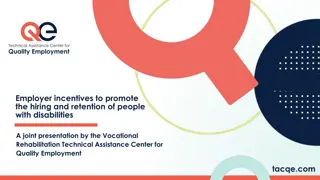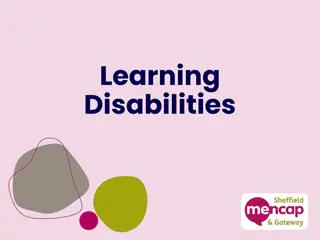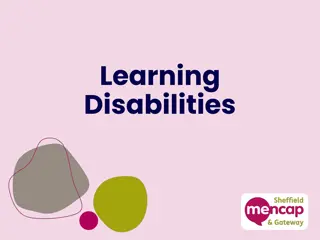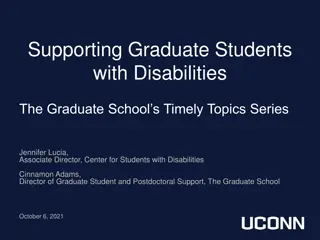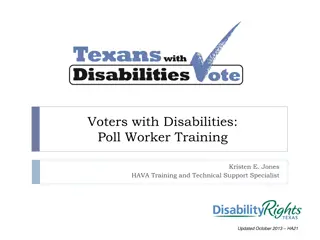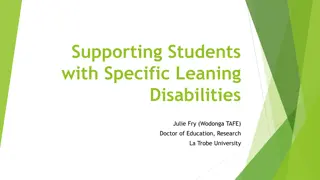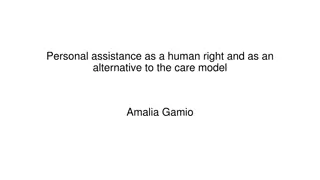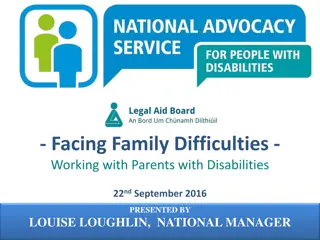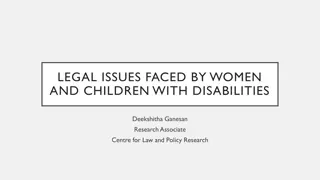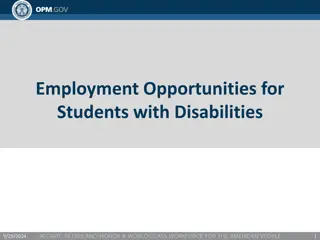Understanding the Evaluation Process for Individuals with Disabilities
This information-rich content delves into the essential guidelines and procedures for evaluating students with exceptionalities under the Individuals with Disabilities Education Act (IDEA). It covers the importance of locating, identifying, and providing services to eligible students, the key participants in the evaluation process, initial evaluation guidelines, different exceptionalities recognized, and the order of operations for evaluations and Individual Education Plan (IEP) development.
Download Presentation

Please find below an Image/Link to download the presentation.
The content on the website is provided AS IS for your information and personal use only. It may not be sold, licensed, or shared on other websites without obtaining consent from the author. Download presentation by click this link. If you encounter any issues during the download, it is possible that the publisher has removed the file from their server.
E N D
Presentation Transcript
Bulletin 1508 Evaluation Process October 13, 2022
Child Find Guidelines Under the Individuals with Disabilities Education Act (IDEA) the Local Education Agency is required to: Locate, Identify, and Provide services to all eligible students with Exceptionalities.
Bulletin 1508 This handbook is the regulatory guide for pupil appraisal personnel when conducting individual evaluations of students suspected of being exceptional and in need of special education and related services, and as a reference for persons requiring specific information regarding the determination of eligibility for special education services.
IDEA/1508 Evaluations Determine.. Eligibility for Services Content of Individual Education Plan (IEP)
KEY PARTICIPANTS: IDEA & LA Revised Statute 17:1941 require that a student suspected of having a disability receive a comprehensive evaluation conducted by pupil appraisal professionals certified by the state Department of Education. Professional Members May Include, but are not limited to: *Teachers; *Educational Diagnosticians; *Certified School Psychologists; *School Social Workers; * Parent
Initial Evaluation Guidelines: Must be completed by trained and knowledgeable individuals. Must cover all areas related to the suspected disability. Must be more than one test or assessment procedure. Must be in the child s native language if at all possible. Must not discriminate against the child. Must be of no cost to the parent.
Exceptionalities: Autism Deaf-Blindness Developmental Delay Emotional Disturbance Hearing Impaired Intellectual Disability Multiple Disabilities Orthopedic Impairment Other Health Impairment Specific Learning Disability Speech or Language Impairment Traumatic Brain Injury Visual Impairment Gifted/Talented
Order of Operations: Screening, Intervention, MTSS Parent Consents to Initial Evaluation - 60 Day timeline begins Evaluation Completed - 30 Day timeline begins for IEP development and completion
Frequently Asked Questions: How long does a school have to respond to an evaluation request in Louisiana? Your school district has 15 school days to respond to your request, in writing. If the school agrees to evaluate, they must provide: (a) a written notice proposing to evaluate, (b) a copy of the procedural safeguards notice, and (c) an opportunity for you to give written consent
Frequently Asked Questions: My child is currently in school and is having academic and/or behavior problems. How do I get him/her evaluated? Students are screened through the Multi-Tiered Systems of Support (MTSS) at the school level. Students who are identified as potentially needing additional assistance are referred for evaluation through the School Building Level Committee (SBLC) at your child s school.
Resources: Louisiana Department of Education: https://www.louisianabelieves.com/docs/default- source/students-with-disabilities/resources-for-parents- of-students-with-disabilities.pdf EBR Exceptional Student Services: Tracy Smith, tsmith13@ebrschools.org 225-929-8601


